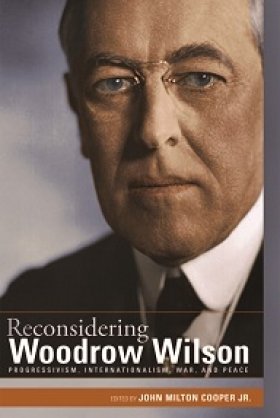Reconsidering Woodrow Wilson: Progressivism, Internationalism, War, and Peace

-
Some of today’s premier experts on Woodrow Wilson contribute to this new collection of essays about the former statesman, portraying him as a complex, even paradoxical president. Reconsidering Woodrow Wilson reveals a person who was at once an international idealist, a structural reformer of the nation’s economy, and a policy maker who was simultaneously accommodating, indifferent, resistant, and hostile to racial and gender reform.
Wilson’s progressivism is discussed in chapters by biographer John Milton Cooper and historians Trygve Throntveit and W. Elliot Brownlee. Wilson’s philosophy about race and nation is taken up by Gary Gerstle, and his gender politics discussed by Victoria Bissel Brown. The seeds of Wilsonianism are considered in chapters by Mark T. Gilderhus on Wilson’s Latin American diplomacy and war; Geoffrey R. Stone on Wilson’s suppression of seditious speech; and Lloyd Ambrosius on entry into World War I. Emily S. Rosenberg and Frank Ninkovich explore the impact of Wilson’s internationalism on capitalism and diplomacy; Martin Walker sets out the echoes of Wilson’s themes in the cold war; and Anne-Marie Slaughter suggests how Wilson might view the promotion of liberal democracy today.
These essays were originally written for a celebration of Wilson’s 150th birthday sponsored by the official national memorial to Wilson—the Woodrow Wilson International Center for Scholars—in collaboration with the Woodrow Wilson House. That daylong symposium examined some of the most important and controversial areas of Wilson’s political life and presidency.
Editor
 John Milton CooperGlobal Fellow, former public policy scholar, former Senior Scholar;
John Milton CooperGlobal Fellow, former public policy scholar, former Senior Scholar;
Professor Emeritus, University of WisconsinBrowse Insights & AnalysisExplore More
Browse Insights & Analysis
Iraq Should Consider Extending UNAMI’s Mission
Posted date/time:
Middle East Dialogue February 2025 Meeting Report
Posted date/time:

